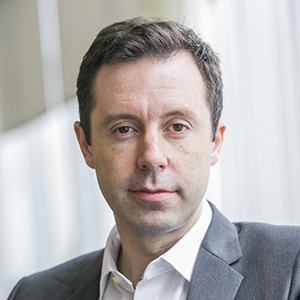
16 Apr Interview with Olivier Elemento of Weill Cornell Medicine

I direct the Englander Institute for Precision Medicine, an Institute that focuses on using genomics and informatics to make medicine more individualized. My research group and I combine Big Data with experimentation and genomic profiling to accelerate the discovery of cancer cures. In cancers, we are elucidating the patterns of aberrant pathway activities, rewiring of regulatory networks and cancer mutations that have occurred in cancer cells. We are also trying to understand how tumors evolve at the genomic and epigenomic level.
Interview with Olivier Elemento of Weill Cornell Medicine
Q: What research are you or your lab focusing on and why, and what problem(s) are you trying to solve?
A: I direct the Englander Institute for Precision Medicine, an Institute that focuses on using genomics and informatics to make medicine more individualized.
My research group and I combine Big Data with experimentation and genomic profiling to accelerate the discovery of cancer cures. A major focus of our research is to develop new technologies that interrogate clinical samples (usually cancer biopsies) through genome sequencing. Our research has led to the development of the first New York State approved whole exome sequencing test for oncology, EXaCT-1, which is now used routinely on patients treated at Weill Cornell Medicine/NewYork Presbyterian Hospital. The test examines the genomic mutations of the more than 21,000 genes in each patient’s cancer cells with tumor-normal comparison to detect point mutations, insertions and deletions, and copy number variations, and promises relatively quick turnaround, with an average time from receipt to sign-out of 18 days.
Our team is far along in development of EXaCT-2, a new test that combines exome sequencing and deep sequencing of hotspots, and is exploring ways to commercialize that test while also looking to bring the original assay to other affiliated hospitals. We are looking forward to finalizing the test in terms of the design, and starting the validation process for New York State approval.
Q: What makes your research unique? Can you share with us some recent findings?
A: My group and I have developed new methods for assessing tumor driving pathways, evaluating the immune landscape of tumors and predicting who will respond to immune therapy (a type of therapy that unleashes immune cells to kill cancer cells).
The research we are performing shows it is not only the number of mutations present in a tumor that is important to immunotherapy response, but what kinds of genes are expressed within the tumor and what they tell you about the kinds of immune cells that exist within that tumor. It is what we call gene-expression deconvolution.
We are combining information from all different tumor signals—the number and type of mutations within a tumor and the number and type of mutations within the tumor’s immune cells—as well as measuring the number and diversity of T cells within a tumor microenvironment, which is also useful in predicting immunotherapy response. We are combining all this different genomic information into a machine learning–based predictive model we call the immune response index. The immune response index seeks to quantify with greater certainty the likely clinical outcome of immunotherapy. We are in a very early stage of research with this technology, but preliminary results show we are able to predict with between 85% and 95% accuracy which patients will respond to some forms of immunotherapy.
We need to independently validate our findings in larger cohorts of patients from other cancer centers, but our research indicates that by combining all types of genomic information, including tumor mutations, tumor RNA expression, and T cell–receptor gene expression, we are able to make very accurate predictions on immunotherapy response.
Q: What excites you about your work?
A: Precision medicine is one of the most promising fields in the collective fight against cancer and other diseases. For me, directing the Englander Institute for Precision Medicine is an opportunity to make an impact on research and healthcare. I see a lot of potential in using precision medicine to target a variety of diseases – Its very exciting to be able to help shape how these approaches will improve patient care. Ultimately, instead of simply giving the same treatment to every patient with what seems to be the same disease, we try to truly understand how disease in each patient is special – what’s specific about it, what’s driving it and then use this information to help personalize treatment strategies.
We have had an ambitious program for oncology care, and have focused our efforts on whole-exome sequencing for patients with advanced cancers, because there is more opportunity for precision medicine to have an impact in these patients. These are patients who have few or no clinical options left, and we are looking to genomics to tell us how we can find additional treatment options for them. Currently, we are limiting our screening to whole-exome sequencing, but very soon, we will be performing whole-genome sequencing on most patients with late-stage cancers.
We are also very much looking to apply the precision medicine paradigm to patients with earlier-stage cancers to learn what we can do in addition to chemotherapy, surgery, or radiation therapy that would specifically target the mechanisms responsible for the cancer, and so we can individualize treatment and potentially induce longer remissions and perhaps even cures in more patients.
Newly diagnosed and early-stage patients have disease that is in theory relatively simpler to treat than advanced disease, which may have been treated with multiple drugs and has likely become highly heterogeneous. The reality is for patients with metastatic disease, even if you can identify an actionable mutation, they will be given drugs with toxicities and may be unable to tolerate those toxicities.
Q: When thinking about your research and the field you are working in, what are some recent breakthroughs that are propelling the field forward and how will they impact healthcare?
A: My group has developed augmented reality approaches for visualizing complex biomedical information. We use machine learning, AI, and data visualization to better grasp the dynamic relationships amongst genes and to develop predictive models to identify factors within cell regulatory networks. With these novel insights into disease pathways, we can develop disease models to learn their mechanisms, target effective drug combinations, and sequentially develop new therapeutic approaches.
The Englander Institute’s computational lab is equipped with state of the art instrumentation, robotics, and customized software that employs numerous software applications to provide high-level analytics and valuable data. Performing these types of analyses can often require extensive computing power and our instruments for conducting them include an array of algorithms and software that were developed by our investigators. Our bioinformatics specialists contribute both in study design and in downstream data analysis.
Our main mission is to make precision medicine a reality for every patient through genomics and other clinical data, by pushing the limits of genomics analysis. Our computational team leads an incredible effort to develop tools to further the collection and processing of tumor DNA and the analysis of its genomics information. In addition, we focus on integrating medical, clinical, and scientific perspectives through data, interactive applications, and community-building platforms to empower our scientists to apply bold ideas with transformative potential.
Q: What are the short-term challenges that your scientific field is facing?
A: Our goal as soon as possible is to sequence every metastatic cancer patient. To do this, we’ve worked to implement EXaCT-1 in the clinical setting and across the NewYork-Presbyterian (NYP) network. We have been doing quite a bit of work now to be able to integrate with Brooklyn Methodist Hospital. There is a lot of interest in terms of being able to offer EXaCT-1, Oncomine, and the myeloid panel to these other sites, so we are working to enable this genomic testing. It is a complicated process, but right now, feasibility pilots are underway.
Among the issues is the fact that Brooklyn Methodist uses a different brand of EHR. EXaCT-1 uses an HL7 interface, so it in theory would work with EHRs not made by Epic, but every installation is different. At NYP, EXaCT-1 also is integrated with a pathology system, Cerner’s CoPath, which involved additional work. It will be difficult to have a product that integrates very easily with all of the existing systems because every hospital has a different combination of systems. There is always going to be some customization that is required to build a vehicle to communicate test results with physicians.
The good news is that EXaCT-1 has been introduced to clinical practice, and, integrated with NYP’s Epic Systems electronic health record. We’ve learned a lot in the process of running EXaCT-1, and are confident that EXaCT-2, with an optimized design, will allow us to identify mutations that are in very low abundance. It will allow us to cover quite a bit of additional genomic space, for example, some exomes that were not covered in the first EXaCT-1 assay, and long term, improve patient care.
Q: Is there anything else you would like to share with the PMWC audience?
A: Long term, I would like to focus on collaboration, ensuring that precision medicine can provide genomics support to a range of clinical programs. We want to be as inclusive as possible, working with fellow investigators who are interested in applying a precision medicine approach to their areas of research and medicine.






